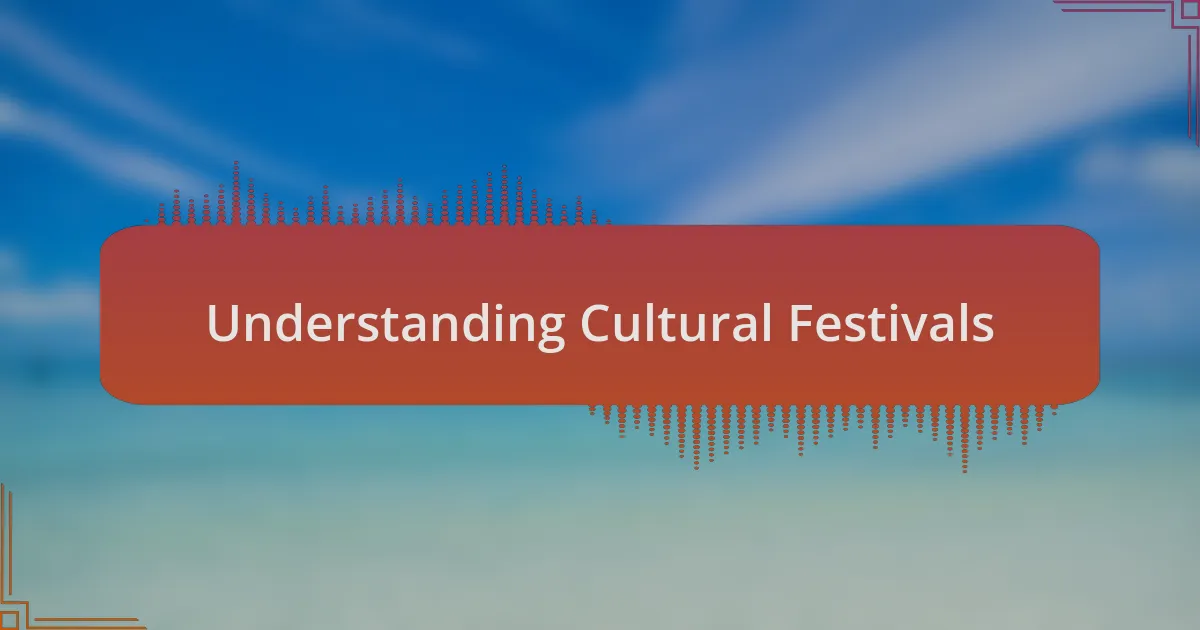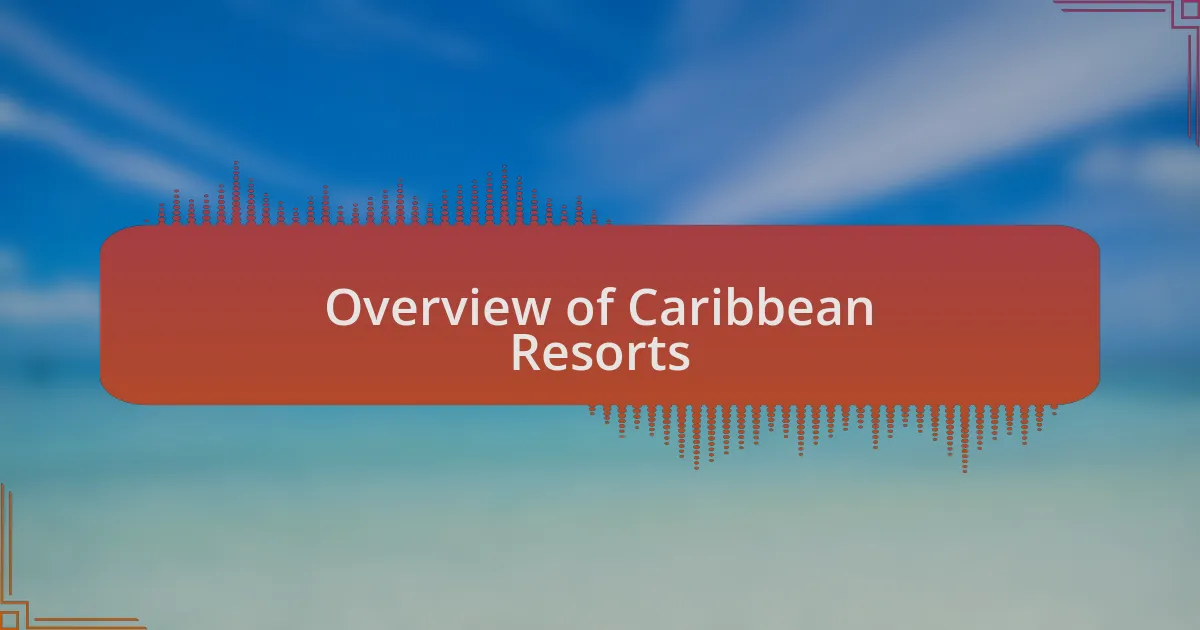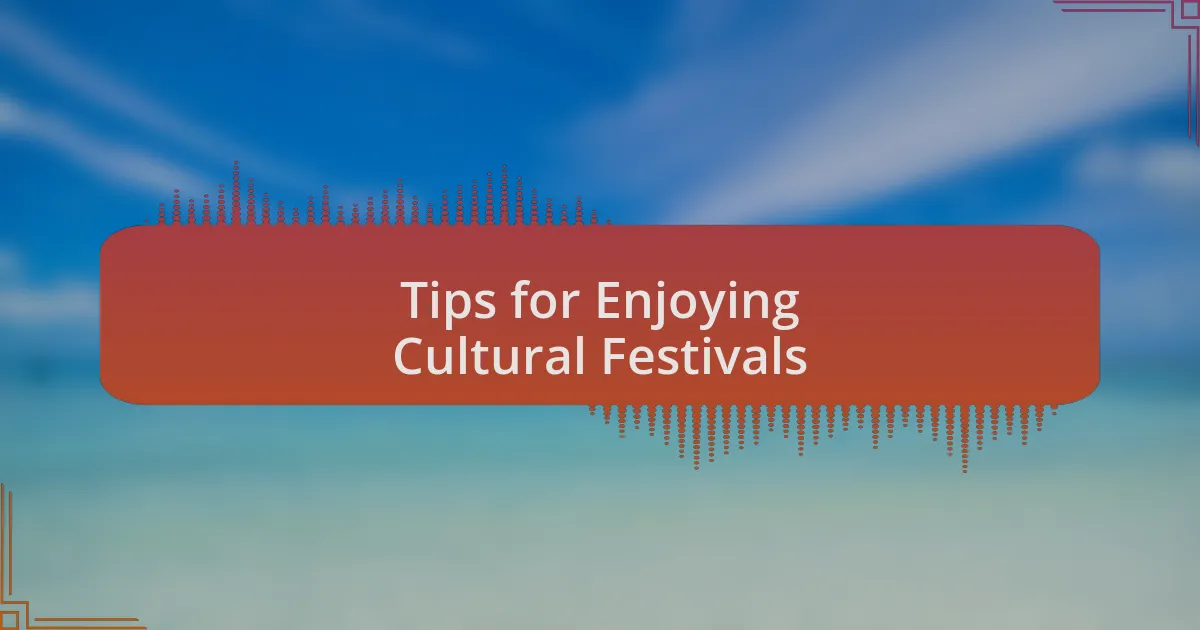Key takeaways:
- Cultural festivals are essential for preserving heritage and fostering community spirit, creating deep connections through shared experiences and traditions.
- Caribbean resorts enhance visitor experiences by reflecting local culture, offering proximity to cultural attractions, and providing diverse amenities.
- Participating in local activities and engaging with festival-goers enriches the festival experience, highlighting the links between food, art, and community narratives.

Understanding Cultural Festivals
Cultural festivals are windows into the soul of a community, showcasing its traditions, artistry, and values. I remember attending a vibrant festival where I first encountered local artisans displaying their crafts. The colors and stories woven into each piece were palpable, making me wonder: how much of our identity is tied to the festivals we celebrate?
When I immerse myself in these celebrations, there’s a deep sense of connection that often catches me by surprise. I recall feeling a rush of joy during a lively street parade, surrounded by the rhythmic beats of drums and the collective energy of the crowd. It reinforced the idea that festivals aren’t just events; they’re collective expressions of joy and resilience that echo through generations.
What strikes me most is how these festivals foster community spirit. I once participated in a cooking competition at a local fair, where families gathered not only to showcase their culinary skills but to share stories and laughter. Engaging in this communal activity led me to ask: how can food and tradition unite us in such profound ways? Each bite carried whispers of heritage, intertwining personal memories with the rich tapestry of cultural history.

Importance of Cultural Festivals
Cultural festivals play a vital role in preserving and transmitting heritage from one generation to the next. I remember attending a festival where elders shared stories from their youth, allowing younger attendees like myself to feel a deeper connection to our shared past. This interaction made me wonder: how often do we take the time to listen to the narratives that shape our identities?
These gatherings also serve as platforms for artists and performers, offering them the chance to showcase their talents. At one particularly memorable event, I watched a group of dancers bring traditional folklore to life. The performance left me in awe, prompting me to reflect on how these artistic expressions not only entertain but also educate us about our cultural roots.
Moreover, cultural festivals foster economic growth within communities by attracting tourism and supporting local businesses. I once explored a market at a festival, where artisans sold handcrafted goods, and local musicians played upbeat tunes. This experience made me realize that every purchase contributes to sustaining those vibrant traditions—an intriguing thought, isn’t it? As we celebrate our cultures, we simultaneously invest in their future.

Overview of Caribbean Resorts
Caribbean resorts are much more than just places to stay; they embody the spirit of the islands. Each resort often reflects the local culture, featuring traditional architecture, warm hospitality, and local cuisine that tantalizes the taste buds. I recall savoring a fresh seafood dish at a beachfront restaurant, the flavors stunningly vibrant, reminding me of how deeply food connects us to a place.
As I’ve traveled across various islands, I’ve noticed that many resorts are strategically positioned near cultural attractions. This proximity allows guests to immerse themselves in the rich heritage of the Caribbean. I remember when I stayed at a resort that organized excursions to local art galleries and historical sites. It sparked my curiosity about the stories behind those artworks, urging me to explore further beyond the sandy shores.
Moreover, the amenities in Caribbean resorts often cater to diverse interests, ensuring there’s something for everyone to enjoy. Whether it’s a tranquil spa day or active water sports, it creates an inviting atmosphere that feels like home. I often ask myself: how do these experiences influence our understanding of Caribbean culture? Each visit shapes the way I see the islands, making me appreciate not just the beauty but also the depth of their cultural narratives.

Planning Your Visit to Festivals
When planning your visit to Caribbean festivals, timing is crucial. Research the festival schedule well in advance. I learned this the hard way when I arrived on an island only to find out I missed the vibrant carnival by a week. It was such a disappointment—not just the missed festivities, but also the opportunity to experience the island’s culture in full swing.
Accommodations can fill up quickly during festival season, so booking your stay as early as possible is wise. I once secured a charming beachside cottage next to the festival grounds, and it made all the difference. Being within walking distance meant I could soak in the music, dance, and laughter without worrying about transportation. Imagine being nestled in the heart of the celebration as lights twinkle in the night sky!
Don’t forget to plan your local activities around the festival! Balancing festival excitement with some exploration of local art, eateries, or historical sites enhances the experience. I recall finding a small gallery tucked away during a festival visit—it was a serene spot filled with stunning works reflecting the island’s history. Both the festival’s energy and the gallery’s tranquility deepened my appreciation for the culture. How can you truly capture the spirit of the Caribbean without experiencing its arts and celebrations hand in hand?

My Personal Experience at Festivals
Experiencing Caribbean festivals is like stepping into a vivid painting where culture comes alive. At the Junkanoo Festival in the Bahamas, I remember being swept up in the colorful parade, feeling the rhythmic beats of the drums reverberate through my body. The sheer joy of dancing alongside locals, surrounded by elaborate costumes, made me feel like I was part of something greater than myself, a celebration of shared heritage.
One of my most unforgettable moments happened at the Reggae Sumfest in Jamaica. I found myself caught in a whirlwind of energy as artists performed, electricity buzzing in the air. While enjoying the music, I engaged in conversations with festival-goers who shared their thoughts on how reggae shaped their lives. It made me ponder: how often do we find such connections in our everyday lives? These encounters during festivals highlight the deep bonds forged through music and shared experiences.
Another time, during a food festival in Trinidad, I was overwhelmed by the variety of flavors. The delicious aroma of doubles (a popular street food) filled my senses as I chatted with vendors about their recipes passed down through generations. One vendor even shared a story about his grandmother’s traditional cooking methods. It struck me how food often tells tales of history and personal journeys. How can one festival provide such a profound insight into a culture? It’s moments like these that leave lasting impressions and foster a deeper appreciation for the traditions of the Caribbean.

Tips for Enjoying Cultural Festivals
Tips for Enjoying Cultural Festivals
To truly savor the atmosphere of a cultural festival, I recommend immersing yourself fully—don’t just watch, participate. Whether it’s joining a dance circle or simply trying your hand at traditional crafts, engaging with local practices creates unforgettable memories. It’s amazing how stepping out of your comfort zone can lead to genuine connections, isn’t it?
Another tip is to savor the local cuisine; food is a gateway to culture. I vividly recall a taste of spicy jerk chicken at a festival in Negril, where the festival-goers shared laughter and stories around food stalls. A small bite opened doors to rich narratives and local traditions, reminding me how vital culinary experiences are to understanding a culture.
Lastly, make an effort to converse with locals. I learned so much from striking up random conversations during a carnival in Barbados, where sharing stories with other attendees added depth to my experience. Those brief interactions often lead to unexpected friendships and insights—who knows what new friends or perspectives await when you ask a simple question?